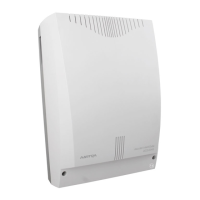Ascotel IntelliGate 2025/2045/2065
Part 2 Features 439
Call forwarding responds differently depending on the system configuration and
the procedure used. The various CFU types are as follows:
• CFU to a variable destination:
The subscriber specifies the chosen call forwarding destination on his terminal.
This CFU can be either unconditional or only if busy.
• Predefined CFU:
The call forwarding is made unconditionally to a destination entered in the sub-
scriber configuration. This destination is also used with the Leave message fea-
ture if the caller is unable to read messages on his terminal.
• CFU if unobtainable:
Where a call is to be diverted to in the event of unavailability can be defined
for DECT handsets in system configuration.
Note:
The unconditional call forwarding to a preconfigured destination can be
overwritten with *67 procedure (see Tab. 2.132).
Detailed Description
Tab. 2.131: Call Forwarding Unconditional
Inter-
face
Operating sequence / signalling on the terminal Scope
B • Obtains acknowledgement tone when acti-
vating and resetting the CFU
• If "CFU first ring = yes" is configured and C is
an internal subscriber, B obtains an attention
tone (short ring) and has 5 seconds in which
to answer the call.
Restriction:
B can only activate a single Call Forwarding
Unconditional. Each new one overwrites the
old one.
C Possible destinations:
• Subscribers: internal, external
1)
, PISN
2)
• PS/coded ringing
• UG: 17 to 21 (2025 / 2045 system) or 25 to
29 (2065 system) and user groups configured
as "large".
• Standard text (leave message)
Requirement:
C is not protected against Call Forwarding
Unconditional (*02).
1)
see "Call Forwarding Unconditional to exchange", page 441.
2)
The conditions for Call Forwarding Unconditional to exchange apply to PISN subscribers in the public net-
work or on a virtually connected PINX.

